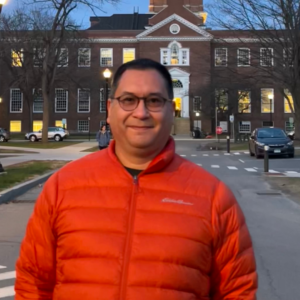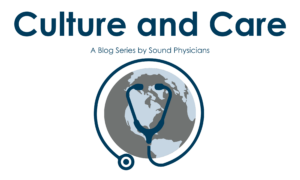December 15, 2022
Culture and Care: A Native American Physician’s Perspective

Dr. Ian Carroll
To care for a patient is to understand their needs—physically, emotionally, and culturally. Healing a body is one thing. Choosing to emphasize respect for a patient’s culture throughout the exchange of care can elevate a clinician’s practice. As a Native American physician, this sentiment is something I have carried with me since medical school. The experiences I had caring for my fellow Native community members shaped me.
I grew up in a big city in Alaska and did not live a traditional “Native” life or speak my traditional language. I am of the Tsimshian nation but was adopted at three days old into a non-Native family in 1971. My father was a physician working for the Indian Health Service, and that was the beginning of my life.
Fast forward to medical school, my heritage played an active role in my education. Over the summer, my clinical learning required me to work at a rural outreach. I chose to go back home to my reserve (slightly different from a reservation) in Metlakatla, Alaska, and serve in the village I was from.
While I was always aware of my heritage, I did not know what it meant to be from somewhere until I practiced there. It was exciting and awkward at first. My wife, who is Cherokee, came with me on a little charter plane that landed on the dock in Metlakatla. She looked at me, the pilot, and everyone nearby before saying, “I know where you’re from!” It was a welcome surprise.
My job was to learn what I could about delivering care in a community, but it turned out to be so much more. In my later years of medical school, I participated in an educational endeavor that allowed me to interview Native physicians. We discussed their cultures, connectedness, and if they “went home” to their own tribal community. Many did not go home or ended up leaving home for complicated reasons.
During my residency in another state, I was often asked to look after the Native patients. Even though we were often from different nations, we were the same people. It helped me develop the sense that I was a Native physician, and it helped me incorporate that into who I am and how I practice.
After residency, I was fortunate enough to go home and practice in Alaska. It was there I grew in my practice and even had the chance to meet family members while working at the Alaska Native Medical Center. I met my maternal grandmother for the first time because I was her attending physician.
To effectively care for Native patients, clinicians must understand, respect, and demonstrate sensitivity to the values and implications of the Native American culture. Understanding cultural beliefs, values, and practices help to build trusted relationships—regardless of your heritage.
For example, Native populations face considerable disparities in access to quality healthcare. It exacerbates one of the most prevalent issues plaguing the community at large: substance abuse. Whether it’s tobacco, alcohol, or other drugs, watching it decimate my community members has been challenging. One of the reasons I left Alaska was because, on average, 60% of an internal medicine physician’s inpatient workload was alcohol-related illness.
One of the biggest challenges I faced in bringing up these issues in a medical setting is that they are often perceived as a cultural attack. Substance abuse of any cultural background is emotionally loaded and challenging to discuss. We all know tobacco is terrible for you, though it does have a place in many indigenous nations. While a more significant shift needs to happen, as physicians, we get to have these discussions on a patient-by-patient basis. As this population grows, it becomes increasingly important for clinicians to identify ways to address the healthcare needs of Native Americans effectively.
When addressing health equity and delivering culturally sensitive care, relationships and trust are key to my mission as a physician. Incorporating cultural competence strategies into your practice will help bridge gaps and provide the world-class care patients of all backgrounds deserve.

